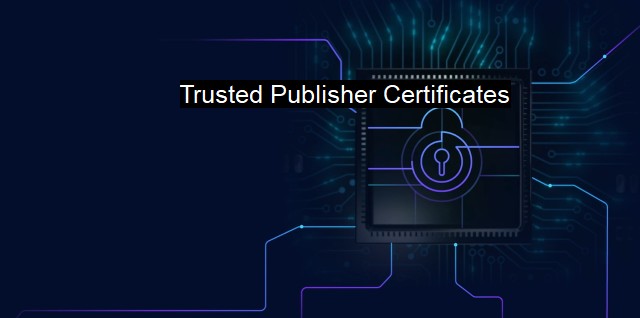What are Trusted Publisher Certificates?
The importance of trusted publisher certificates in ensuring safe and secure software downloads in the digital age
A trusted publisher certificate is essentially a digital document that helps ascertain the credibility and authenticity of an online entity. This type of certificate is focused on making sure that the publisher or distributer of software is indeed genuine, and not a cyber attacker pretending to be trustworthy. Used chiefly it plays an instrumental role in antivirus strategies, particularly as they pertain to defending networks or devices against potential threats.The concept of trusted publisher certificates operates around the employment of cryptographic principles for the identification of online publishers. Each certificate is uniquely encrypted, including information about the entity it represents, issuance and expiration dates, in addition to the distinctly generated public key. A well-established, authorized Certificate Authority (CA) is responsible for issuing these certificates. They also undertake stringent verification processes to ensure the publisher's legitimacy.
The trusted publisher certificates serve as a protective layer in a multifaceted cyberdefense strategy. When a user downloads and installs software, the certificate helps identify the publisher and validate its credibility. Therefore, it can save users from inadvertently downloading malicious software posed by cybercriminals, thwarting possible attacks at the point of entry.
The system in place for the validation of certificates involves both public-key cryptography and digital signatures. The public-key cryptography comprises a pair of mathematically related keys- one public, stored in the certificate, and another private, known only by the publisher. When the publisher signs their software digitally, they use this private key.
On the part of the user, their software authenticates the signature using the public key from the downloaded software. If these two steps align and the math works out, it signals the software has not been tampered with since it was signed. This gives the assurance to the user that the software is authentic and safe to install.
Another exciting aspect of trusted publisher certificates is in their role in developing an environment of trust, and the link to antivirus strategies should not be ignored. The construction of this environment keeps users from encountering many types of malware threats and lowers the possibility of an attack happening on their devices or networks. This is achieved by preventing any unsigned, potentially harmful software from being installed.
Trusted publisher certificates serve crucially with automated trust decisions on devices. For instance, centrally managed devices can be programmed to automatically trust software provided by publishers with valid certificates, simplifying software installation and updates across vast networks, and enhancing their safe deployment.
With that said, threat actors can still misuse trusted publisher certificates, by stealing or fraudulently acquiring them. Hence, it is always important to ensure that the certificates come from appropriate, reliable sources or CAs.
In the end, one can not overstate the significance and the necessity of understanding trusted publisher certificates for everyone operating in the world of cybersecurity. These certificates not only help recognize credible software but can revolutionize the way we understand and manage cyber threats.
Built to support and create that important “trust” online, trusted publisher certificates assist in protecting the integrity, confidentiality, and authenticity of digitally posted items, providing an imperative tool in the battle against cybercrime. From an antivirus perspective, these certificates provide the first line of defense against potential threats, ensuring that the installations are safe and are derived from trustworthy sources.
While trust mechanisms need further improvements and consistent updates to address the growing sophistication of cyber threats – the trusted publisher certificates has found a central place in the cybersecurity domain, continuing the battle alongside antivirus software against the pervasive threats of the cyber world.

Trusted Publisher Certificates FAQs
What is a trusted publisher certificate?
A trusted publisher certificate is a digital certificate that is issued to developers and software publishers by a trusted Certificate Authority (CA). It is used to verify the identity of the publisher and ensure that the software is legitimate and secure.Why is a trusted publisher certificate important for cybersecurity?
A trusted publisher certificate is important for cybersecurity because it helps to prevent malware and other types of malicious software from being installed on your computer. By verifying the identity of the publisher, it ensures that the software is legitimate and has not been tampered with.How do you know if a publisher certificate is trusted?
You can check if a publisher certificate is trusted by looking at the certificate details in your browser or antivirus software. The certificate should be issued by a trusted Certificate Authority, and the publisher's name should match the name of the software that you are installing.What are the benefits of using software with a trusted publisher certificate?
Using software with a trusted publisher certificate provides several benefits, such as increased security and reduced risk of malware infections. It also ensures that the software is legitimate and has not been tampered with, which can help to protect sensitive data and prevent unauthorized access to your computer. Additionally, it can help to minimize downtime and reduce the costs associated with repairing or replacing infected systems.| | A | | | B | | | C | | | D | | | E | | | F | | | G | | | H | | | I | | | J | | | K | | | L | | | M | |
| | N | | | O | | | P | | | Q | | | R | | | S | | | T | | | U | | | V | | | W | | | X | | | Y | | | Z | |
| | 1 | | | 2 | | | 3 | | | 4 | | | 7 | | | 8 | | |||||||